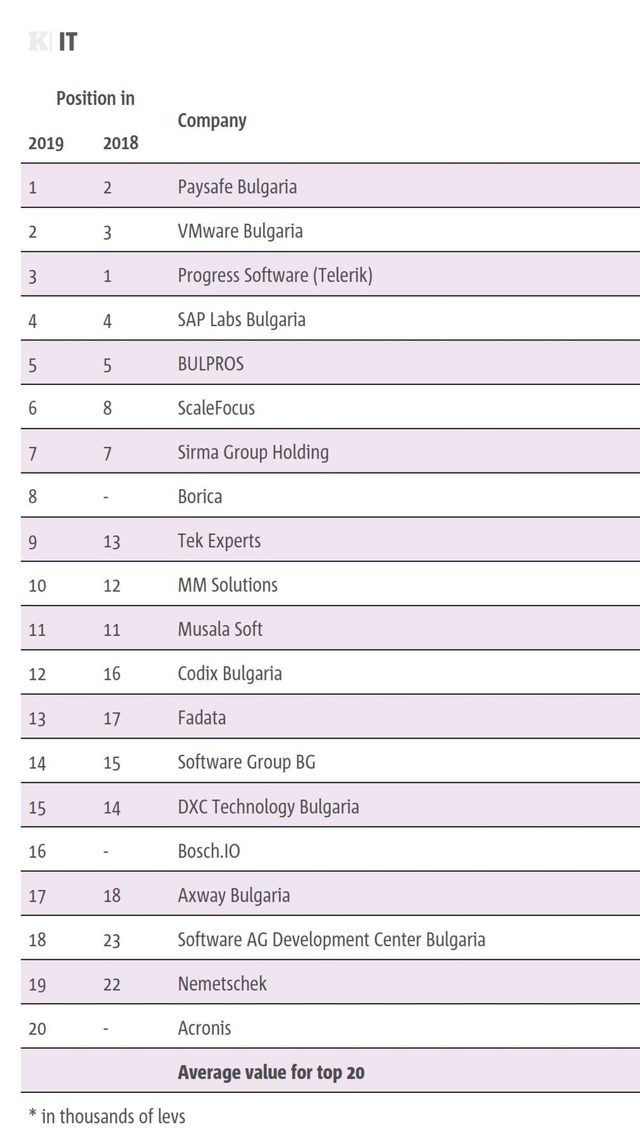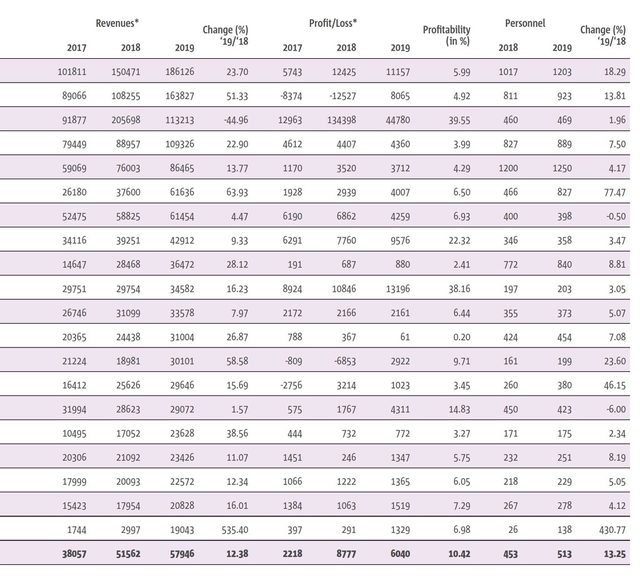The combined revenue of the top 20 young companies in Bulgaria's software industry passed the one-billion-lev revenue mark in 2019 and for the first time, four of them booked a turnover exceeding 100 million levs (51.1 million euro). It has become a tradition for the IT sector to be the fastest-growing and revenues again increased by almost 25% last year if the effect from the one-off drop in Progress' revenue by some 100 million levs is excluded. Even if it is taken into account, growth remained strong at 12.4%.
The sector made other achievements too: all companies boosted their revenues (except for Progress) and they all posted a profit, with 13 of them improving their bottom line from the previous year. In addition, the top 20 companies attracted a record 1,200 engineers last year, taking their total headcount to more than 10,000. It is no surprise that 2019 was a good year for software companies in Bulgaria: the IT sector is undoubtedly the big winner from a decade of unprecedented economic growth and the last pre-coronavirus crisis year makes no exception.
With the initial shock from the Covid-19 outbreak now gone, the pandemic and its impact on the economy will hardly cool down the labour market for software specialists. In March and April, the expectations were that the sector's honeymoon would soon be over. Now those fears have been overcome to a large extent: yes, the economic shocks will certainly cause problems to the companies that digitalize traditional businesses but nevertheless, the sector will be among the least affected by the crisis.
Other factors also help the companies in the ranking: most of them are big and not as vulnerable to short-term adverse developments as the small ones. Most of them have their own products and do not rely on orders from customers but rather on the market appetite for digital solutions and products - and the coronavirus crisis has undoubtedly enhanced it. Last but not least, the largest software companies in Bulgaria are predominantly branches of international giants, which gives them stability.
Shifts at the top
The first three companies in the previous year's ranking changed positions in 2019 but the composition of the top trio remained the same. The local branch of digital payment solutions company Paysafe recovered its first place as the biggest software company in Bulgaria after a year's break. The company reported revenues of more than 186 million levs in 2019 and though growth slowed down, it still remained considerable at nearly 24%.
Despite the Covid-19 crisis, the company still expects some growth in revenue and the number of employees this year. The explanation is simple: the Bulgarian branch develops Paysafe's digital portfolios that enjoy strong demand during the pandemic when online payments are well on the rise. "IT is one of the least affected sectors both in terms of business indicators and in terms of the need for reorganization. The economic slowdown may be felt at a later stage, so IT companies are very disciplined financially," Paysafe general manager for Bulgaria Miroslav Bozhilov said.
The Bulgarian division of U.S.-based VMware is second in the ranking with an impressive 50% increase in revenues. After posting losses the previous two years, in 2019 VMware Bulgaria swung to a profit, booking a solid bottom-line result of 8 million levs.
"The current situation is posing unprecedented challenges to business but our company is stable and doing well. In 2020 we expect continued growth, both in terms of financial results and in terms of expansion of the team," said Diana Stefanova, VMware managing director Europe, Middle East and Africa.
Third in the ranking is last year's leader: the Bulgarian office of U.S.-based Progress, which acquired Telerik in 2014. On the face of it, the company's revenues slumped from more than 200 million levs in 2018 to 113 million levs in 2019. However, the reason for the drop in revenue is a one-off effect from the sale of intangible assets in 2018. The Bulgarian company maintains moderate and healthy operational growth, which is likely to be preserved in the coronavirus environment.
Very close to the top trio and with a rise in revenue of more than 20% to 109 million levs last year is SAP Labs Bulgaria, the development unit of Germany's business software producer SAP. "We continue hiring specialists and expect to book 5 to 10% growth in 2020," CEO Radoslav Nikolov said.
Bulgarian runners-up
The top four positions in the IT ranking may be steadily occupied by subsidiaries of foreign companies but there are Bulgarian firms waiting just around the corner. All companies from 5th to 11th place are Bulgarian-owned with the exception of international company Tek Experts, which is registered in Bulgaria and has a big office in Sofia.
The largest Bulgarian-owned software company is Bulpros. In 2019 its growth slowed down to 13% from nearly 30% in 2018, with revenues topping 86 million levs. "In 2019 we made two strategic partnerships that gave us new development opportunities. We are now an IBM Gold Business Partner and our second strategic partnership is with U.S.-based Domain 6," CEO Ivaylo Slavov said. "If there is a positive aspect of the Covid-19 pandemic, it is the acceleration of digitalization. Therefore we forecast a substantial increase in demand for digital solutions this year and next. We project a two-digit hike in our 2020 revenues."
Scale Focus, which saw an increase of revenue of more than 60% in 2019, comes sixth in the ranking. However, it is among the more pessimistic companies as regards the short-term consequences of the pandemic. "The situation is gradually improving in Bulgaria but not so much in the world and we are a company that works for foreign markets mainly," shareholder and CEO Plamen Tsekov said.
Sirma Group is 7th in the ranking with a moderate increase in revenue to 61.4 million leva. Earlier this year, CEO Tsvetan Alexiev commented that the company was hit by the coronavirus crisis mainly because of the U.S. market, where customers suspended or reduced their operations. "Starting a new project is therefore much harder, which affects our sales," he said.
Payment system developer Borica is 8th in the ranking. Its revenues also increased moderately, from 39.2 million levs to 42.9 million leva, but its profit jumped more than 23% to 9.5 million levs. Tek Experts, which works mainly in the area of technical maintenance, preserved its impressive growth. The company's revenue for the last two years reached 36.4 million levs, up 150% in 2017. The company projects to maintain or even speed up its growth as a result of the coronavirus. "We expect to increase the number of our employees. We have had to hire 160 new specialists this year, which shows that our services are more in demand than ever," the manager of the Sofia office, Georgi Kostadinov, said.
Still, optimism
The managers of the largest IT companies in Bulgaria are unanimous that the pandemic will have a minimum or even a positive effect on business, at least for now. Many of them believe that bigger challenges are ahead, as the overall economic slowdown will inevitably affect their customers - and the companies' own business as a result.
"It is difficult to make a forecast in the current situation but we believe that the effect on our current projects will be minimal because 100% of the work processes and communication with customers can be conducted online," said Milen Glushkov, financial director at Fadata, which works mainly for financial and insurance companies. "We admit in our analyses that some of the new deals planned for 2020 will be postponed until 2021, as customers adopt a more conservative investment policy in the crisis. On the other hand, the pandemic will encourage many insurance companies to invest in digitalization and optimization."
A similar opinion is shared by other companies in the same field of business. "Most technological companies in our area are doing well," Software Group CEO Kalin Radev said. "Unfortunately, we are witnessing a substantial drop in business in other sectors."
The virus has given an opportunity to companies to show they can operate outside the traditional office and many of them want to keep it that way once the crisis is over.
"We do not think the business climate has changed much in the past few months, at least as far as companies in our sector are concerned. The flexibility that the state of emergency gave us - such as quickly switching to home office without unnecessary administrative steps and requirements - should be preserved in normal conditions too," said Paysafe's Miroslav Bozhilov.
Labour demand stays strong
For many companies, the first months of the state of emergency introduced on March 13 brought concerns - but also hopes - that the labour market would finally cool down. IT companies in Bulgaria have been suffering from a constant shortage of qualified software developers for years. The initial concerns and hopes, however, have turned out to be unfounded: several months later they are all busy hiring.
"Despite the crisis, we continue looking for new employees: software developers, end-client service staff, specialists with experience in the financial sphere," said Miroslav Bozhilov.
"VMware keeps on actively hiring people in Bulgaria and we have more than 100 open positions at present. At the beginning of the state of emergency, we noticed a temporary change in market dynamics and some professionals preferred to wait and see instead of change their job. Now we can see that people are adapting to the situation and the market is returning to normal," VMware's Diana Stefanova said


The combined revenue of the top 20 young companies in Bulgaria's software industry passed the one-billion-lev revenue mark in 2019 and for the first time, four of them booked a turnover exceeding 100 million levs (51.1 million euro). It has become a tradition for the IT sector to be the fastest-growing and revenues again increased by almost 25% last year if the effect from the one-off drop in Progress' revenue by some 100 million levs is excluded. Even if it is taken into account, growth remained strong at 12.4%.
The sector made other achievements too: all companies boosted their revenues (except for Progress) and they all posted a profit, with 13 of them improving their bottom line from the previous year. In addition, the top 20 companies attracted a record 1,200 engineers last year, taking their total headcount to more than 10,000. It is no surprise that 2019 was a good year for software companies in Bulgaria: the IT sector is undoubtedly the big winner from a decade of unprecedented economic growth and the last pre-coronavirus crisis year makes no exception.












